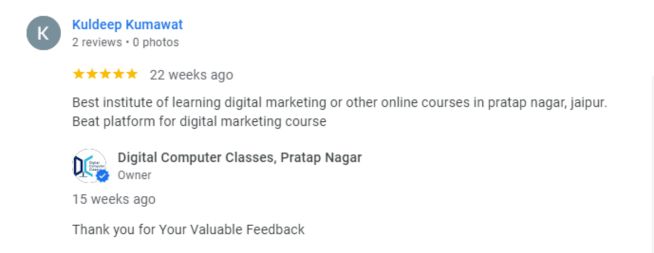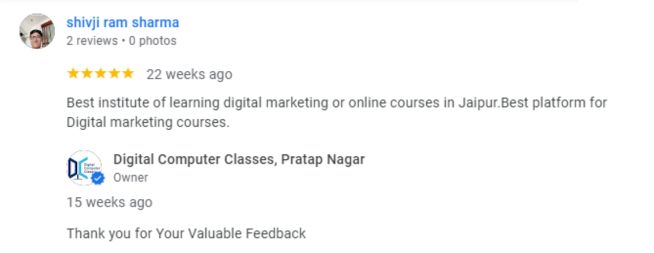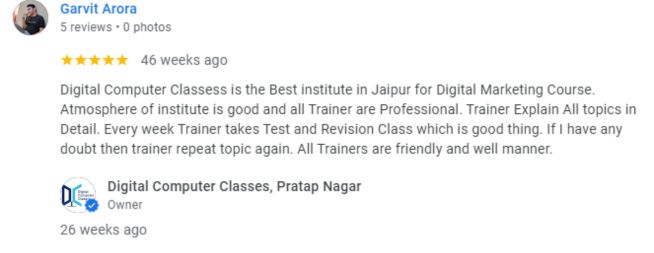C++ Programming in Jaipur
Overview:
C++ is a powerful and versatile programming language known for its efficiency, flexibility, and performance. It is widely used in system software, game development, embedded systems, scientific computing, and more. C++ supports both procedural and object-oriented programming paradigms and offers features like strong typing, low-level memory manipulation, and a rich standard library.
Course Objectives:
- Fundamentals of C++: Master the syntax, data types, variables, operators, control structures (loops, conditionals), functions, and pointers in C++.
- Object-Oriented Programming (OOP): Understand classes, objects, inheritance, polymorphism, encapsulation, and abstraction in C++.
- STL (Standard Template Library): Utilize STL containers (like vectors, lists, maps), algorithms (sorting, searching), and iterators for efficient data manipulation.
- File I/O Operations: Read from and write to files using C++ streams, handling text and binary data effectively.
- Memory Management: Learn about dynamic memory allocation and deallocation using new and delete operators, smart pointers (like unique_ptr, shared_ptr), and memory management techniques.
- Exception Handling: Implement exception handling to manage runtime errors and ensure robust error recovery in C++ programs.
- Concurrency: Develop multithreaded applications using C++ threads, synchronization primitives (mutex, condition variables), and atomic operations.
- Advanced Topics: Explore advanced C++ features such as lambda expressions, move semantics, function objects, and template metaprogramming for generic programming.
Prerequisite / Target Audience:
This course is suitable for beginners and intermediate programmers looking to deepen their understanding of C++ programming. Prior experience with any programming language is beneficial but not required. It is ideal for students, software developers, and engineers interested in systems programming, game development, or applications requiring high performance and efficiency.
Course Modules
- What is C++ Programming?
- Evolution and History of C++
- Distinctions Between C and C++
- Object-Oriented Programming and Key Concepts of OOP”
- C++ Streams Overview
- Code for comprehending cin and cout streams
- Code for understanding get() and put() functions
- Code for grasping read() and write() functions
- Code for comprehending getline() and write() functions
- Structure of a C++ Program
- Tokens in C++
- Data Types in C++
- Explicit Type Casting
- Implicit Type Casting
- Constants in C++
- Operators in C++
- Reference and Dereference Operators
- Scope Resolution Operator
- Memory Management Operators
- Comparison between malloc() and new in C++
- Demonstration of new and delete operators
- Dynamic Memory Allocation and Deallocation
- Array of Pointers
- Dynamic Memory Allocation for 2-D Array
- Reference Variables in C++
- free() vs delete in C++
- Comma Operator”
- C++ if-else Statements
- Determine Grades Based on Student Marks
- C++ switch Statement
- Identify if a Character is a Vowel or Consonant
- C++ Looping
- Verify if a Number is a Neon Number
- Ascertain if a Number is a Spy Number
- Validate if a Number is an Automorphic Number
- Print Floyd’s Triangle
- Use of goto Statement in C++
- Utilize exit() Function in C++
- Continue Statement in C++
- Introduction to C++ Functions
- Passing by Pointer vs. Passing by Reference
- Call by Address
- Call by Reference
- Return by Reference
- Default Arguments
- Inline Function
- Distinctions Between Inline and Macro
- Polymorphism and Function Overloading
- Introduction to Classes and Objects in C++
- Understanding Public, Private, and Protected Keywords
- Demonstration of Class and Object
- Sorting Array Elements and Demonstrating String Usage with Class and Object
- Finding the Reverse of a String
- Passing Objects to Functions
- Returning Objects as Arguments
- Working with Arrays of Objects
- Implementation of External Member Function Using Inline
- Exploring Static Data Members and Static Member Functions
- Friend Function Concept in C++
- Introduction to Constructors in C++
- Exploring Copy Constructors in C++
- Constructor Overloading
- Default Arguments in Constructors
- Understanding Anonymous Objects
- Constructors and Destructors with Static Members
- Introduction to Operator Overloading
- Overloading with Friend Functions
- Conversion from Basic Data Type to User-Defined Data Type (Class Type)
- Conversion from Class Type to Basic Data Type
- Conversion between Different Class Types
- Rules for Overloading Operators
- Exploring Inheritance and Access Specifiers in C++
- Virtual Base Class in C++
- Single-Level Inheritance
- Constructors in Multiple Inheritance
- Parameterized Constructors in Inheritance
- Container Ship
- Advantages and Disadvantages of Inheritance
- Working with Pointers to Objects
- The ‘this’ Pointer in C++
- Early Binding and Late Binding in C++
- Introduction to C++ Virtual Functions
- Pure Virtual Functions and Abstract Classes in C++
- Differences b/w compile time and run time polymorphism
- Handling Files with File Streams in C++
- Example of Writing to a File using C++ FileStream
- Example of Reading from a File using C++ FileStream
- C++ Read and Write Illustration
- Demonstrating EOF Function and Append Mode
- Reversing the Content of a File
- Introduction to Exception Handling in C++
- Handling Exceptions in Constructors and Destructors
- Managing Uncaught Exceptions
- Exceptions and Inheritance
- ARRAY Container in STL
- Using PAIR in C++ STL
- Introduction to TUPLE in C++ STL
- Utilizing Vector Class in C++ STL
- Final exam or assessment to evaluate course comprehension
- Certification of completion for successful participants

Grab the spotlight by getting certified!
Certificates can help you learn new skills, advance your career, and stand out to employers. Here are some benefits of certificates.
Industry-Recognized Certificate
MSME & ISO Certified recognisation helps you to stand out in job market
Increase Employability
This increases employability and enhances their chances of securing desirable job opportunities.
Enhancing Career Oportunities
Students can gain an edge in the job market and enhances their career opportunities.
Why Choose Us!
Free Career Counselling & Guidance from Us For your Job We work with you, not for you. Although we have a great resources.
10+ Year Experienced Trainer
Get experienced in divergent Era with our professional & experience trainers and team member can provide you with valuable insights skill at Digital Computer Classes.
Get Free Intership
Gain practical experience through complimentary internship placements,providing you with valuable hands-on learning in real-world scenarios, essential for your career growth.
Work on Live Projects
Immerse yourself in live projects during your training experienced the gap between theory and practice.This practical implimentation boost your skills and confidence in your choosen field.
Hi-Tech Classrooms
Experience learning in air conditioning classrooms equipped with LED screen facility its enhancing your educational journey with a conducive environment that fosters concentration,innovation and collaboration.
Real-Time Doubt Solving Session
During sessions where instructors address your queries promptly,ensuring a doubtless learning experience. Clear doubts as they arise, maximizing your understanding and progress.
100% Placement Assistance
We have our own company and tied with 21 +partnership in jaipur we assure that you will get 100% placement in our All professional courses.




















